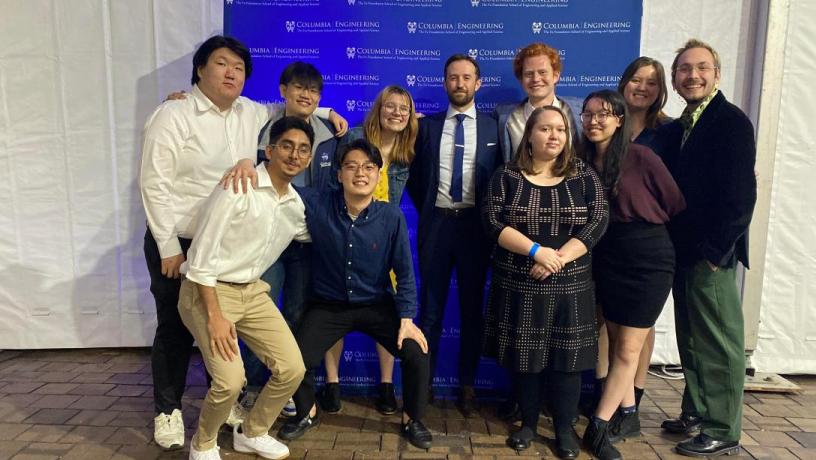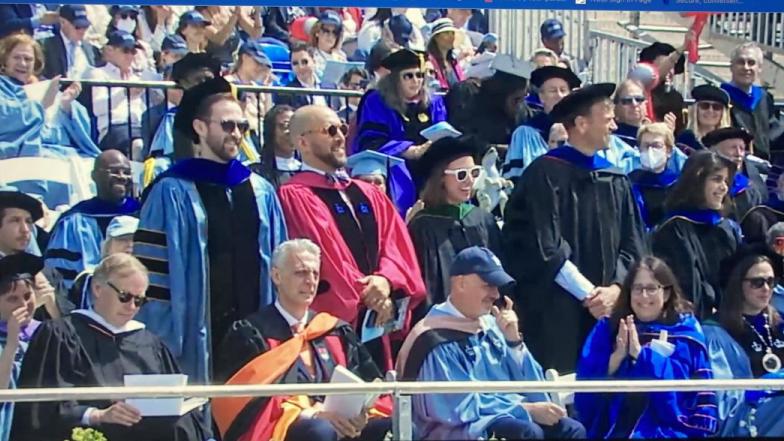Yevgeniy Yesilevskiy Receives Presidential Award for Outstanding Teaching
Yevgeniy Yesilevskiy, a Lecturer in the Discipline of Innovation and Design in the Mechanical Engineering Department at Columbia University, received one of the Columbia University’s Presidential Award for Outstanding Teaching at the May 2022 Commencement ceremony.
The award was established in 1996 to recognize and celebrate the faculty and graduate students who exemplify excellence in teaching. Prospective recipients are nominated by their students and peers. From that pool, the faculty members on the Teaching Awards Committee select the final awardees.
Since he joined the Mechanical Engineering faculty in 2019, Yesilevskiy has been teaching courses with an active, project-based focus, including Mechanical Engineering Lab 1, Machine Design, and the Senior Design Capstone course. His additional responsibilities include identifying needs for curriculum and course enhancement within the Mechanical Engineering department, and developing new teaching modules and initiatives to address them.
Among students and faculty, Yesilevskiy is recognized for his innovative teaching approaches to mechanical engineering that transform mechanical engineering undergraduate students into the problem solvers of tomorrow. “My goal as an educator is not just to prepare students to solve problems that already exist, but to make them comfortable with solving open-ended challenges and comfortable with uncertainty, so they will be able to answer questions that we can’t even foresee arising,” said Yesilevskiy. “In all of my courses, I include open-ended, project-based components because I believe that those types of challenges prepare them for a rapidly changing world.”
That goal took on particular significance in the early stages of the Covid pandemic, when teaching shifted from in-person to remote learning. In May 2020, Yesilevskiy petitioned the Mechanical Engineering Department to send project kits to students. “For Seniors, I submitted a component list that included 3D printers, motors, electronics, soldering irons, tools, and safety equipment,” he explained. “For Juniors, I recommended a pared down version of the kit tailored to their laboratory classes.”
Yesilevskiy spent much of that summer testing the kit components, developing safety protocols, and working with Columbia’s division of Environmental Health & Safety to receive approval. He coordinated the parts selection with professors and met often with the former Chair of the Mechanical Engineering Department, Jefferey Kysar, to ensure the kits fit within budget.
When the kits received approval, Yesilevskiy revamped his courses to work with the kits. “I worked with the Mechanical Engineering Department’s lab technicians to develop user guides for kit components and oversee the massive ordering undertaking,” he said. “In my view, project-based and active learning are so fundamentally important to our students’ educations, we couldn’t afford to have even one semester without it.”
Yesilevskiy’s creative, action-oriented method for problem solving was swiftly implemented during the height of the Covid pandemic, when existing manufacturing lines for traditional face shields were stretched too thin to meet demand. Yesilevskiy collaborated with Columbia Mechanical Engineering faculty and technical staff to create novel designs for face shields that could be manufactured at scale, by the tens to hundreds of thousands per day. “Jeffrey Kysar learned from Anil Lalwani, MD, his research colleague at New York Presbyterian, about the urgent need for face shields at the NYP hospital network,” explained Yesilevskiy. “Jeff contacted me about the problem, and within a week, I led a design team that included Jeff, Anil, Andrei Shylo, Senior Lab Technician and William Miller, Lab Manager of the Columbia Makerspace, to develop a face shield that could be cut out of a single piece of plastic (FaceShieldOne), drastically reducing the complexity of the manufacturing process and the number of materials that had to be sourced.”
Once the design was completed and approved by the hospital network, the team immediately began working with a local manufacturer to ramp up production. “The NYP network ordered two million face shields, as they sought to meet their 50,000 per day demand,” explains Yesilevskiy. “As the manufacturer was setting up the production line, Kristin Myers, Associate Professor of Mechanical Engineering, and Amanda Lombardo, Senior Lab Technician, led the charge to purchase over two tons of thin plastic sheets. Andrei, William and I began cutting out thousands of face shields on the waterjet in the Columbia Makerspace to hold the hospital network over until the manufacturer could begin production. In the end we cut out approximately 16,000 before the manufacturer began deliveries.” This and other face shield designs from Columbia’s engineering team are now in use or production at other New York City hospitals, as well as in Europe, Thailand, and around the globe.
In the diverse field of Mechanical Engineering, Yesilevskiy helps his student find their particular niche. “I want my students to find their passion through my courses,” he said. “By letting students explore pathways of their choosing in my classes, I hope that they are able to better explore the areas that interest them most.”
For Yesilevskiy, one of the greatest challenges of teaching mechanical engineering is restoring students’ confidence. “Engineering is tough. After taking a diverse array of courses, and in a competitive environment surrounded by very intelligent students, it is easy for students to feel overwhelmed,” he said. “By the time they reach my classes, it is not uncommon for students to feel down on themselves for not performing better in some of their classes. Since in my courses, they build tangible devices, I try to use that as an opportunity to rebuild and grow their belief in themselves. Their excitement when they get a piece of their projects to work, helps them to again realize what they’re capable of.”
“I want my students to become independent thinkers,” said Yesilevskiy. “I am happy to provide guidance as they struggle, but overwhelmingly, when they ask me questions, I often ask them questions back. I try to make sure that they are the ones that are discovering the answers. In that way, I hope that they leave Columbia with the confidence that they can solve anything that comes their way.”
At Columbia, only five professors University-wide receive the Presidential Award for Outstanding Teaching. “I was floored when I received the news that I was getting the award,” said Yesilevskiy. “Receiving this award made me stop and reflect on the incredible students that I have had. It’s an honor to play a small role in fostering their inquisitiveness and enthusiasm.”
“The award made me reflect on the support I’ve received from my department,” he added. “Many of the ideas I’ve had for my courses have represented wholesale changes in the way those topics had been previously taught. It’s been a joy to work in an environment where an idea like sending every single student 3D printers and other prototyping equipment in the pandemic isn’t just heard, but actively pursued and aided until it is a reality.”
“Most importantly, receiving this award made me reflect on the tireless efforts of our machine shop staff,” he added. “All of the project-based courses that I teach lead to many hours of prototyping and machining. The overwhelming majority of the effort to help students with their projects comes from the staff. Robert Stark, Amanda Lombardo, Daniela Durón García, William Miller, and Andrey Shilo truly deserve as much credit for this award as I do. Their tireless efforts make Columbia Mechanical Engineering a place where any idea is possible.”


